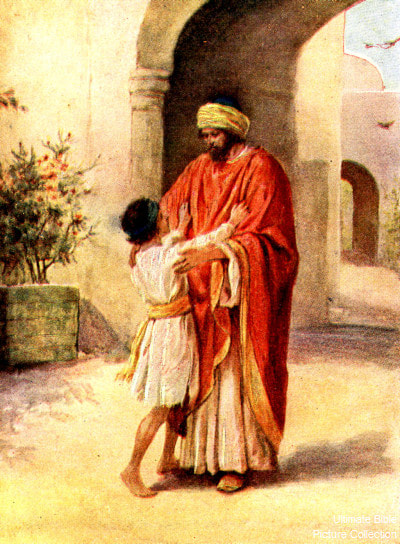The Gospel According to St. John
The King James Bible
|
John 4:43-54
The second miracle in Galilee 43 Now after two days he departed thence, and went into Galilee. 44 For Jesus himself testified, that a prophet hath no honour in his own country. 45 Then when he was come into Galilee, the Galilaeans received him, having seen all the things that he did at Jerusalem at the feast: for they also went unto the feast. 46 So Jesus came again into Cana of Galilee, where he made the water wine. And there was a certain nobleman, whose son was sick at Capernaum. 47 When he heard that Jesus was come out of Judaea into Galilee, he went unto him, and besought him that he would come down, and heal his son: for he was at the point of death. 48 Then said Jesus unto him, Except ye see signs and wonders, ye will not believe. 49 The nobleman saith unto him, Sir, come down ere my child die. 50 Jesus saith unto him, Go thy way; thy son liveth. And the man believed the word that Jesus had spoken unto him, and he went his way. 51 And as he was now going down, his servants met him, and told him, saying, Thy son liveth. 52 Then enquired he of them the hour when he began to amend. And they said unto him, Yesterday at the seventh hour the fever left him. 53 So the father knew that it was at the same hour, in the which Jesus said unto him, Thy son liveth: and himself believed, and his whole house. 54 This is again the second miracle that Jesus did, when he was come out of Judaea into Galilee. |
Margin notes:
"After two days he departed." (4:43) - Jesus stayed two days with the Samaritan woman and the people of Sychar. "Went into Galilee." (4:43) - But not to His hometown of Nazareth in Galilee. Nazareth knew Jesus as a simple carpenter and didn't believe He was the Messiah (Matthew 13:54-58). "Jesus himself testified, that a prophet hath no honour in his own country." (4:44) - Jesus "testified" to this in Matthew 13:57; Mark 6:4 and in Luke 4:24 to highlight how the Jewish people were slow to accept the Messiah while many Gentiles were open to His message. "The Galilaeans received him, having seen all the things that he did at Jerusalem at the feast." (4:45) - John mentions these Passover feast miracles in John 2:23, and Nicodemus acknowledged them in verse 3:2. "Where he made the water wine." (4:46) - See John 2:1-11. "Nobleman." (4:46) - Most Bible scholars believe the nobleman was a government official in Capernaum who worked for King Herod Antipas. "He went unto him." (4:47) - The "nobleman" walked over thirty miles round trip seeking Jesus' help. "Besought him that he would come down, and heal his son." (4:47) - "Begged Jesus to come and heal his son." "Except ye see signs and wonders." (4:48) - "Unless you see miracles." "Come down ere my child die." (4:49) - "Come before my child dies." "Yesterday at the seventh hour." (4:52) - "Yesterday at one P.M." "The second miracle." (4:54) - Healing the nobleman's son was the second miracle Jesus performed in Galilee, but the Messiah had already performed miracles in other areas. Later, the people in His hometown of Nazareth asked Jesus to duplicate this miracle for them (Luke 4:23). |
There is a similar miracle reported in Matthew 8:5-13 and Luke 7:1-10.
New Living Translation
John 4:43-54
Jesus Heals an Official's Son
43 At the end of the two days, Jesus went on to Galilee.
44 He himself had said that a prophet is not honored in his own hometown.
45 Yet the Galileans welcomed him, for they had been in Jerusalem at the Passover celebration and had seen everything he did there.
46 As he traveled through Galilee, he came to Cana, where he had turned the water into wine. There was a government official in nearby Capernaum whose son was very sick.
47 When he heard that Jesus had come from Judea to Galilee, he went and begged Jesus to come to Capernaum to heal his son, who was about to die.
48 Jesus asked, "Will you never believe in me unless you see miraculous signs and wonders?"
49 The official pleaded, "Lord, please come now before my little boy dies."
50 Then Jesus told him, "Go back home. Your son will live!" And the man believed what Jesus said and started home.
51 While the man was on his way, some of his servants met him with the news that his son was alive and well.
52 He asked them when the boy had begun to get better, and they replied, "Yesterday afternoon at one o'clock his fever suddenly disappeared!"
53 Then the father realized that that was the very time Jesus had told him, "Your son will live." And he and his entire household believed in Jesus.
54 This was the second miraculous sign Jesus did in Galilee after coming from Judea.
This second Bible text from the "New Living Translation" (Tyndale House, Publishers, Wheaton, Illinois) is a paraphrase and not an accurate word for word translation of the Bible. However, it is a helpful tool when read with the "King James Version."
Today's question:
1. Did the "nobleman" only believe because Jesus healed his son? (4:50)
Most people who flee from temptation leave a forwarding address.
1. Did the "nobleman" only believe because Jesus healed his son? (4:50)
Most people who flee from temptation leave a forwarding address.
Answer: (Do you agree?)
1. No, while it's true that many people need a miracle to believe (4:48), the nobleman's words and actions show remarkable faith even before Jesus healed his son. First, instead of staying with his dying son, he set out for a thirty-plus mile walk over hard ground seeking Jesus' help (4:47). Second, when he met Jesus, the "nobleman" humbly called Him "Sir" (4:49). Third, when told to "Go thy way; thy son liveth," he believed Jesus and left for home (4:50). The nobleman proved his faith by believing Jesus before he knew his son had recovered (4:53).
Application thought for the day:
How strong is your faith?
Do you need prayers answered or a miracle in your life to believe?
1. No, while it's true that many people need a miracle to believe (4:48), the nobleman's words and actions show remarkable faith even before Jesus healed his son. First, instead of staying with his dying son, he set out for a thirty-plus mile walk over hard ground seeking Jesus' help (4:47). Second, when he met Jesus, the "nobleman" humbly called Him "Sir" (4:49). Third, when told to "Go thy way; thy son liveth," he believed Jesus and left for home (4:50). The nobleman proved his faith by believing Jesus before he knew his son had recovered (4:53).
Application thought for the day:
How strong is your faith?
Do you need prayers answered or a miracle in your life to believe?
Thanks to the writings and commentary of John Wesley and Adam Clarke. Also, "The Layman's Bible Study Notebook" by Irving Jensen published by Harvest House Publishing, Irvine, California; the "Life Change Series" published by NavPress Books, Colorado Springs, Colorado; the "Life Application Study Bible" published by Tyndale House Publishing, Carol Stream, Illinois; the "Quest Study Bible" published by The Zondervan Corporation, Grand Rapids, Michigan; "Robertson's New Testament Word Studies; " "The MacArthur Bible Commentary" by John MacArthur published by Thomas Nelson, Nashville, Tennessee; "Wisdom of the Bible" CD by Topics Entertainment, Inc., Renton, Washington for their inspiring pictures; "My utmost for His Highest" by Oswald Chambers published by Barbour Publishing, Inc., Uhrichsville, Ohio; The "Treasury of Scriptural Knowledge" by Reuben Archer Torrey; "Hope For Each Day" by Billy Graham published by J. Countryman, a division of Thomas Nelson, Inc., Nashville, Tennessee; "Easton's Bible Dictionary" by Matthew George Easton; "Unger's Bible Dictionary" by Merrill F. Unger, published by Moody Press, Chicago, Illinois; "Halley's Bible Handbook" by Henry H. Halley, Zondervan Publishing House, Grand Rapids, Michigan; "The Everyday Bible" published by World Wide Publications, Minneapolis, Minnesota; "The Living New Testament" published by Tyndale house; "The New Living Translation" published by Tyndale House; "The New Testament" translated from the Latin Vulgate, published by Guild Press, New York, New York; BibleGateway.com for all their wonderful links; and of course the "King James Bible." All were critical in putting these lessons together.
© 2020 evolke
© 2020 evolke




